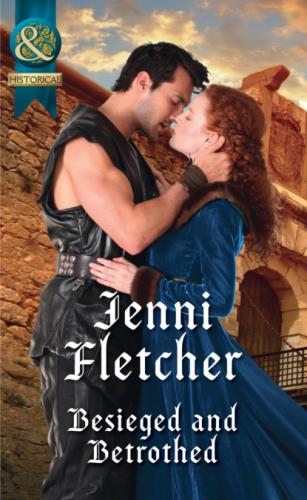Bound to her enemy
Ruthless warrior Lothar the Frank has laid siege to Castle Haword, but there’s a fiery redhead in his way—and she’s not backing down!
More tomboy than trembling maiden, Lady Juliana Danville would rather die than lose the castle. When she’s caught on opposite sides of a war, a marriage bargain is brokered to bring peace. But is blissful married life possible when Juliana has a dangerous secret hidden within the castle walls?
Lothar rubbed his jaw gingerly with his knuckles as Juliana stormed away. In retrospect, he supposed he might have handled the situation better. She was right—their marriage was a greater advancement than any he could have expected—but her accusations had undermined his self-control to the extent that he’d finally lost his temper.
He’d meant to say that he’d accepted the offer because he wanted to help her keep her inheritance—not to steal it for himself. He’d meant to say that he was a soldier—that when it came to managing a castle she was a far better person for the job. He’d meant to reassure her that it would be a marriage in name only, at least insofar as she wanted it to be one. Most of all, he’d meant to tell her that nothing about this was a game.
Instead he’d told her she looked like a stablehand. That had definitely been a mistake.
I first became interested in the Empress Matilda as a child, after reading about her escape from Oxford Castle during the siege of 1142, dressed all in white for camouflage in the snow. Unfortunately that story is often all that gets told about a woman whose incredible biography has been largely—and ironically—whitewashed out of history. The daughter and mother of kings, wife of an emperor and then a count, Matilda was a strong woman for any age, and yet she never managed to regain the birthright that was usurped by her cousin Stephen.
Matilda’s problem—as Helen Castor’s brilliant book She-Wolves: The Women Who Ruled England Before Elizabeth points out—was not that she was a woman, but that she was expected to behave like one: to be Queen and yet not assert her own individual authority—a contradiction that the Medieval mindset seemed unable to overcome, and that I find fascinating.
This story, whilst not directly about Matilda, is partly about the roles women were and weren’t allowed to hold in twelfth-century England—four centuries before Elizabeth I came to the throne. Despite my bias, however, I do have a soft spot for Stephen, who was more merciful than the majority of Medieval kings, and did actually pardon some of those who rebelled against him. At a distance of almost nine hundred years, it’s impossible to judge who was the hero and who the villain...but, for the purposes of this story at least, I side with Matilda.
Besieged and Betrothed
Jenni Fletcher
Jenni Fletcher was born on the north coast of Scotland, and now lives in Yorkshire with her husband and two children. She wanted to be a writer as a child, but got distracted by reading instead, finally writing down her first paragraph thirty years later. She’s had more jobs than she can remember, but has finally found one she loves. She can be contacted via Twitter, @jenniauthor.
Books by Jenni Fletcher
Mills & Boon Historical Romance
Married to Her Enemy
The Convenient Felstone Marriage
Besieged and Betrothed
Visit the Author Profile page at millsandboon.co.uk.
MILLS & BOON
Before you start reading, why not sign up?
Thank you for downloading this Mills & Boon book. If you want to hear about exclusive discounts, special offers and competitions, sign up to our email newsletter today!
Or simply visit
Mills & Boon emails are completely free to receive and you can unsubscribe at any time via the link in any email we send you.
To Andy, again, and my family as always (that includes you, Hilary!)
Also a huge thank-you to Kim, Christine, Emma and Sharon, without whose help I’d still only be halfway through.
And to Claudia, who could give any empress a run for her money.
Contents
